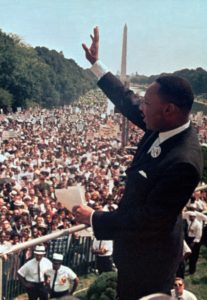| |||
|
IGE is a meeting place for community groups that share our concerns about human rights and education for multicultural and religious awareness. We promote peaceful conflict resolution through training, workshops with youth and adults, and ongoing community discussion.
Non-Violence in The Present
Non-violence is not talked about very much at this time, but it is a crucial component of human life. It is true that humans want to maintain themselves in groups of similar people. It feels safer and easier. However, the fear of apparently different others eventually leads to violence against other people, property, and institutions. We must recognize that fear and bravely practice non-violence. We may have been socialized to accept violence. It is difficult to be non-violent, especially since it is seen as cowardice and weakness, but it is absolutely necessary in these troubled times. There are very useful books, videos, and teachers who can help us change our thinking and actions. Gene Sharp has written a great deal and so has Marshall Rosenberg. Great pacifists like Dorothy Day and others struggled to promote peaceful ways of relating to others. Non-violence requires constant practice.
Twelve-step programs promote respect for oneself and others and ways of saying your truth in kind ways, “say what you mean, but don’t say it mean.” We begin with goodwill, acceptance, and listening to others in order to achieve conflict resolution. The structures of humanity in families, other relationships, business, and government need to always begin with the assumption of goodwill and honesty tempered with kindness. Yes, sometimes hostile behavior requires defensive action to protect ourselves and others, but hostility should never come first.
Formal education and informal socialization must stress the equality of all humans. Everyone deserves to be treated equitably. Of course, babies, sick, and infirm people need extra care and attention. We must practice the cultivation of courage and patience with ourselves and others. Differences of countries of origin, color, gender, gender preference, wealth, age, intelligence, religion in people should not determine greater or lesser status. Connection with others is a necessity for all humans. Our Institute for Global Education office has some good literature on non-violence for all ages of people.
By: Kate Villaire
Essentials for Smiles: Care items for the Unhoused

March 12,, 2021
Dear Patron,
There are many unhoused citizens in and around greater Grand Rapids this year. The wintertime was especially difficult for these individuals due to the harsh winter weather in Michigan. The encampment at Heartside Park was uprooted as well, making things more difficult for them because it takes away the makeshift homes they had established for themselves. The Covid-19 Pandemic is only exasperating the situation because the people need to remain apart and in sanitary conditions to remain healthy. The dire need that the unhoused have is only growing. Now that spring is around the corner, we hope to brighten people’s days with simple essential items that are vital for their wellbeing.
At the Institute for Global Education (IGE), we seek to help our unhoused neighbors and friends by partnering with local non-profits. We have found that St. Mark’s Episcopal Church at 134 Division Avenue North, Grand Rapids, MI 49503 provides services to these individuals. At the IGE, we started gathering supplies to put together care packages of essential products.
Would you consider donating either funding or essentials outlined below for our care packages to help us achieve our mission?
We call this mission “Essentials for Smiles” in hopes of brightening people’s days and ensuring they have essentials they need for the foreseeable future such as masks, chap sticks, and gloves.
We greatly appreciate your donation and it will be used to put together more care packages. If you wish to contribute funds, please go to Paypal or send us a check made out to IGE indicating “Essentials for Smiles”. To donate essentials, please call our office at 616-454-1642.
Sincerely,
Essentials for Smiles Committee
Non-Violence; Martin Luther King Jr. and Ghandi

Many years ago, I spent some time in Tennessee. There was an organization in Memphis similar to Institue for Global Education (IGE), and I was volunteering with them. People from Grand Rapids who had been members of IGE and had moved South had founded this organization, using the IGE as a pattern. On Martin Luther King Jr’s (MLK) Birthday, in order to celebrate, the group held a well-attended event in a giant church in Memphis. Arun Ghandi, Mahatma Ghandi’s grandson, was the featured speaker. I remember talking to Arun after he spoke. I gave him the January 15th page from my page-a-day quote calendar: it quoted Ghandi about non-violence in honor of MLK’s birthday. Arun loved the calendar page and told me that Martin Luther King Jr. was the only one who had seriously implemented his grandfather’s ideas. He had used them to craft the American non-violent civil rights revolution. Arun said he was staying there in Memphis in order to research and study MLK’s papers.
More things you might not know about Martin Luther King Jr.; Martin Luther King Jr. was not born with that name. His birth name was Michael King Jr. If he later changed his name from Michael King Jr. to Martin Luther King, Jr., how could he be a Jr.? Because his father was also Michael King – Michael King Sr. The father changed his own name to Martin Luther and the son followed. So, the Jr. is correct as his name was the same as his father’s at 12 years of age, Martin Luther King Jr. jumped out of a second-story window, allegedly attempting suicide. At 15 years of age, without finishing high school, Martin Luther King Jr. started at Morehouse College in Atlanta. He graduated in 1948 with a Bachelor of Arts degree in Sociology. He then entered Crozier Theological Seminary in Pennsylvania and finished with a Doctor of Divinity degree in 1951. He received his Ph.D. in Theology from Boston University in 1955 and became Dr. King.
How many times did MLK Jr. go to jail? 29. This sounds like a lot especially for a scholar and preacher and purveyor of non-violence. But remember, the police and the government wanted to punish him for his activities. For example, one time he was jailed for driving 30 mph in a 25-mph zone. How many times did people attempt to take MLK Jr.’s life? Twice, that we know of. What close relative of MLK Jr.’s did an assassin kill? His mother. How many African Americans have a declared federal holiday on the day of their birth? One. How many other Americans have a declared federal holiday on the day of their birth? Two – both were Presidents.
By: Diane Baum
Review: Fred Hampton and the Black Panther Party

Time: Sunday, Feb 28, 2021 at 4:30 PM Eastern Time (US and Canada)
This political movement was born during the turbulent civil rights era of the 1960’s. Its goal was to defend communities of color from police brutality and oppression. It was also a social movement that offered many free services to struggling neighborhoods. Under the leadership of Huey P. Newton, the Panthers created “Survival Programs,” helping people with basic needs like comprehensive medical and educational assistance, and “Free Breakfast for Children.”Here is the Black Panthers’ Ten-Point Program from 1967.
- We want freedom. We want power to determine the destiny of our Black Community.
- We want full employment for our people.
- We want an end to the robbery by the Capitalists of our Black Community.
- We want decent housing fit for shelter of human beings.
- We want education for our people that exposes the true nature of this decadent American society. We want education that teaches us our true history and our role in the present day society.
- We want all Black men to be exempt from military service.
- We want an immediate end to POLICE BRUTALITY and MURDER of Black people.
- We want freedom for all Black men held in federal, state, county and city prisons and jails.
- We want all Black people, when brought to trial, to be tried in court by a jury of their peer group or people from their Black Communities, as defined by the Constitution of the United States.
- We want land, bread, housing, education, clothing, justice and peace.
How compelling that this radical agenda speaks to us today in 2021!
In 1969, Fred Hampton of the Black Panthers, William “Preacherman” Fesperman of the Young Patriots and our own Jose “Cha Cha” Jimenez of the Young Lords founded the first Rainbow Coalition in the Lincoln Park neighborhood of Chicago. In place of the usual brawling street-gang activity, the Coalition relied on nonviolent community organization. It began an effective campaign against police brutality, poverty, corruption and gentrification in low-income neighborhoods of Chicago.
In 1967, the FBI with its COINTELPRO, initiated a campaign to disrupt the Panthers’ successful social programs and destroy the Black Panthers entirely. J. Edgar Hoover believed the Panthers to be the greatest threat to the internal security of the United States. Most historians consider the death of Fred Hampton a political assassination by our government. The current film, “Judas and the Black Messiah” explores the Black Panthers, the final days of Fred Hampton, and the events that led to his death.
Written By: Gerard Akkerhuis | Edited By: Diane Baum
Resources: Judas and the Black Messiah Wiki | Black Panther Party Wiki | Rainbow Coalition – Fred Hampton Wiki
